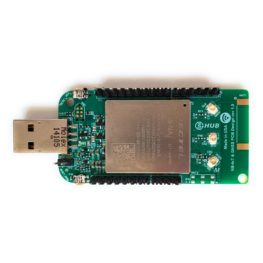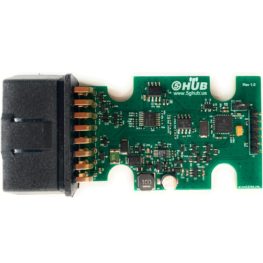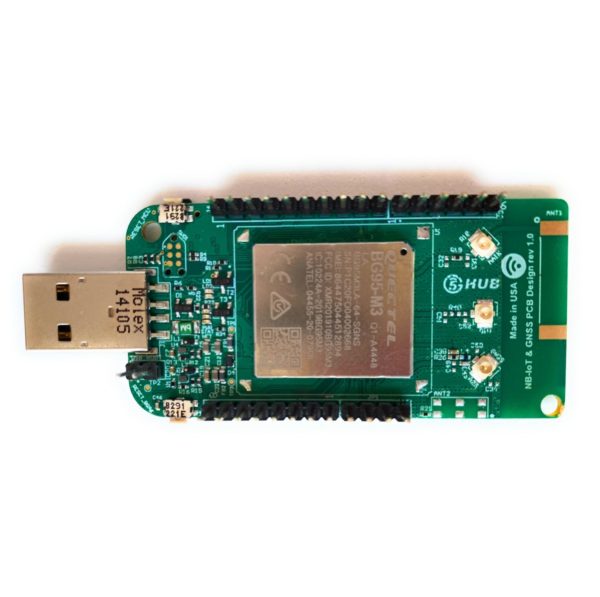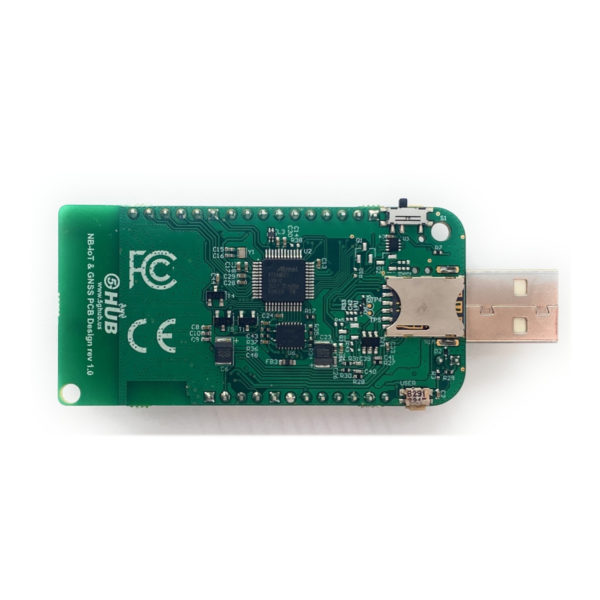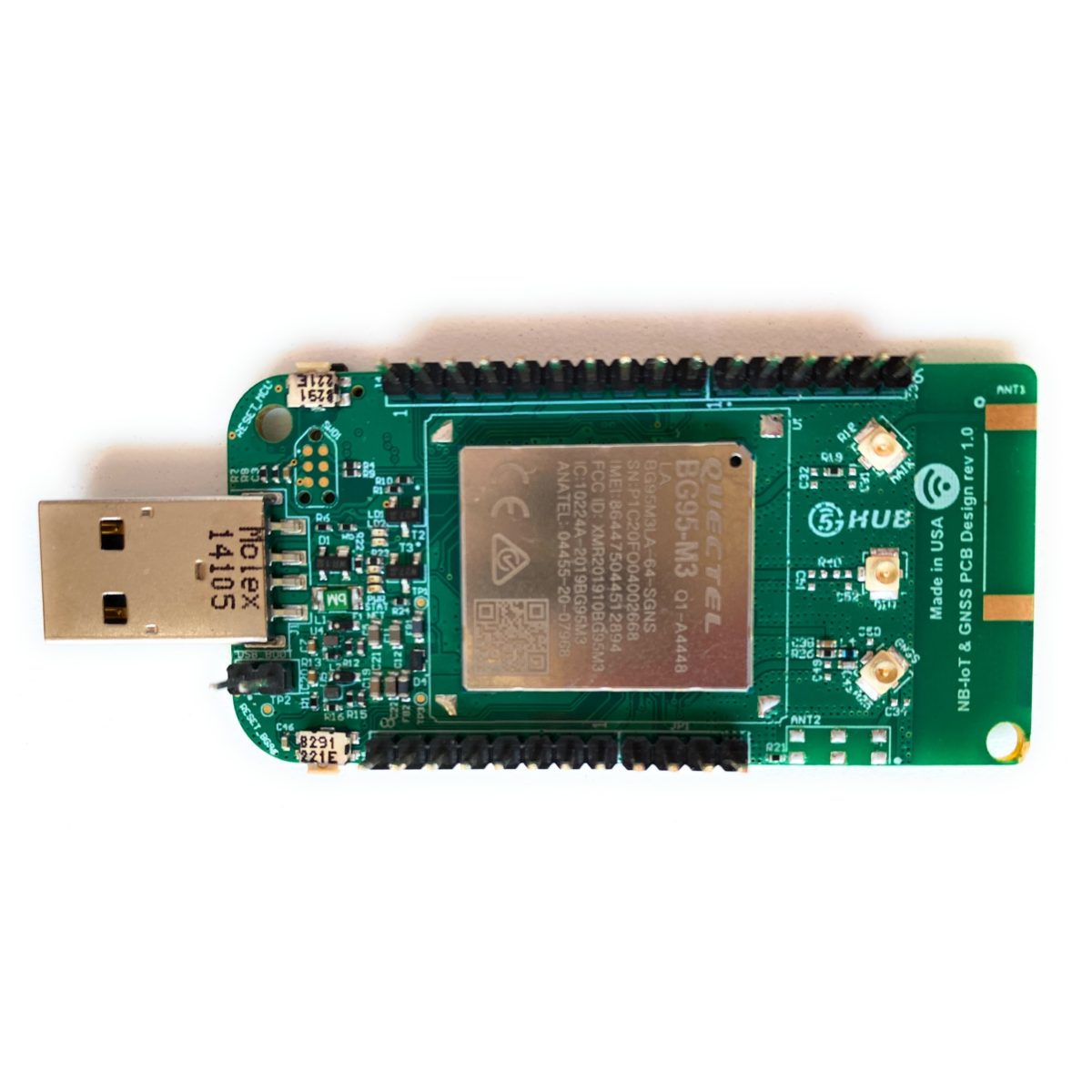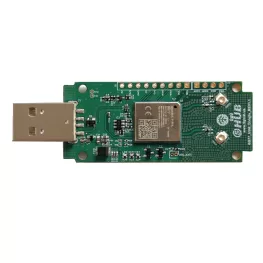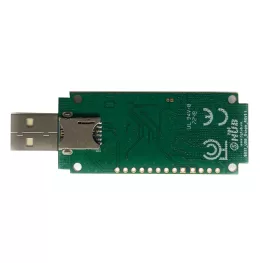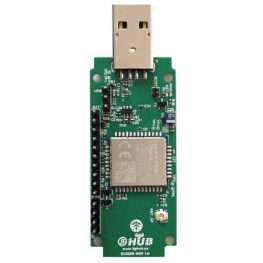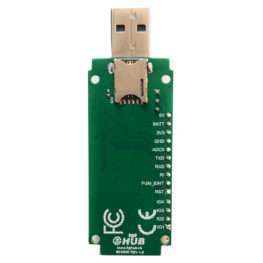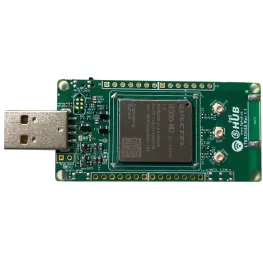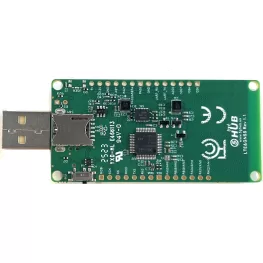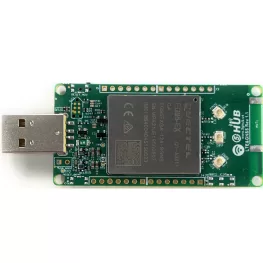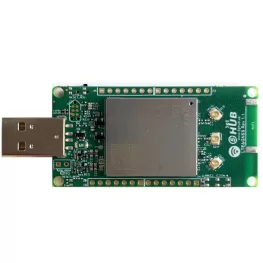Description
This is Cat NB2 NB-IoT & GNSS USB dongle. The USB dongle has connectors for LTE & GNSS antennas. The board is a powerful board that features a microcontroller and wireless modem. The microcontroller is an Atmel’s SAMD21G18A MCU which features a 32-bit ARM Cortex® M0+ core. The wireless modem is BG95 which is an embedded IoT (LTE Cat-M1, LTE Cat-NB2 and EGPRS) wireless communication module. BG95 wireless modem provides a maximum data rate of 588 Kbps downlink and 1119 Kbps uplink. It features ultra-low power consumption, provides data connectivity on LTE-FDD/GPRS/EDGE networks, and supports half-duplex operation in LTE networks. It also provides GNSS to meet customers’ specific application demands
The USB dongle provides rich sets of Internet protocols, industry-standard interfaces (USB/UART/I2C/Status Indicator) and abundant functionalities. The board offer a high integration level and enables integrators and developers to easily design their applications and take advantage of the board low power consumption, many functionalities, and USB drivers for Windows 7/8/8.1/10, Linux and Android.
The kit is a rich hardware board that can be used for the latest 5G wireless technology and enables a variety of smart and 5G applications for devices, and acts as a great educational tool for learning about 5G and 32-bit application development. It enables large number of applications such as wireless POS, smart metering, tracking, smart transportation, smart buildings, smart city, and smart homes.
The board is also compatible with Arduino and Arduino software (IDE). Arduino sketches and examples are provided with the kit and additional sketches can be developed and uploaded to the board.
- Atmel ATSAMD21G18 MCU
- Quectel BG95 Cat NB2 NB-IoT and Cat M Machine-type module
- LTE & GPS antenna
- Supports LTE NB-IoT and Machine Type Communications (MTC)
- Supports EGPRS
- Global RF Bands
- Cat NB2 Band: B1/B2/B3/B4/B5/B8/B12/B13/B18/B19/B20/B25/B26/B28/B66/B71/B85
- Cat M1 Band: B1/B2/B3/B4/B5/B8/B12/B13/B14/B18/B19/B20/B25/B26/B27/B28/B66/B85
- Supports the protocols TCP/UDP/PPP/ SSL/ TLS/ FTP(S)/ HTTP(S)/ NITZ/ PING/ MQTT
- Supports SMS
- Supports GNSS technology (GPS, GLONASS, BeiDou/Compass, Galileo, QZSS)
- Compact board size of 32mm x 65.1mm
- Nano USIM card slot
- Arduino IDE Compatible
- Works with Windows, Linux, or Android
- Ready for smart applications and development (smart home, smart city, smart transportation, smart metering, smart farming, smart waste management, asset tracking, location, navigation, mapping, and timing applications). Application such as Gas Detector, Soil PH Tester, Optical Sensor, Machinery Alarm System, Irrigation Controller, Elevator, Asset Tracking Electronics, Person/Pet Tracking, Water/Gas Metering, Smart Parking System, Fire Hydrant, Smoke Alarm, Trash Bin, Street Lighting
- The board operates on a power supply of 5V
- Each of the 14 general purpose I/O pins on the board can be used for digital input or digital output using pinMode(), digitalWrite(), and digitalRead() Pins used for PWM can be using analogWrite()function. All pins operate at 3.3 volts. Each pin can source or sink a maximum of 10 mA and has an internal pull-up resistor (disconnected by default) of 20-60 K ohm.
| Microcontroller (MCU) | Atmel ATSAMD21G18, 32-Bit ARM Cortex M0+ |
| Clock Speed | 48 MHz |
| Flash Memory | 256 KB |
| SRAM | 32 KB |
| NB-IoT Module | Quectel BG95 |
| Dimension | 32 mm (width) by 65.1 mm (length) |
| Weight | 22 grams |
| Power Supply | USB (5V) |
| LED | LED1, LED2, PWR LED, Status LED, Netlight LED |
| Interfacing Logic Voltage Level (Operating Voltage) | 3.3V |
| Voltage output | 5V, 3.3V |
| RESET buttons | Two; one for MCU and one for BG95 |
| User-defined Button | 1 connected to MCU |
| USB Switch | 1 switch to connect to MCU directly or BG95 directly |
| General-purpose digital I/O Pins | 14 (A0-A5, PA6, PA7, SS, MOSI, MISO, SCK, SDA, SCL) |
| GPIO | 2 connected to BG95 |
| ADC | 2 connected to BG95 |
| USB | 2 |
| I2C | 1 |
| SPI | 1 |
| UART | 1 |
| ADC pins | 6 (8/10/12-bit ADC channels) |
| DAC pin | 1 (10-bit DAC) |
| External interrupts | 14 (All general-purpose PINs) |
| PWM pin | 6 |
| DC Current per I/O Pin | 10 mA |
| JTAG Debug | Cortex Debug Connector (Single Wire Debug) |
| USIM | Nano |
| GNSS | GPS, GLONASS, BeiDou/Compass, Galileo, QZSS |
| Antenna | 1 main antenna and 1 GPS antenna |
| Band | LTE-FDD Cat NB2: B1/B2/B3/B4/B5/B8/B12/B13/B18/B19/B20/
B25/B26/B28/B66/B71/B85 Cat M1: B1/B2/B3/B4/B5/B8/B12/B13/B14/B18/B19/B20/B25/ B26/B27/B28/B66/B85 |
| Certification | FCC, CE, IC |
| Mobile Operator Certification | Verizon, AT&T, T-Mobile |
Notes:
- UART can be programmed through any of general-purpose pins.
- SPI can be programmed through any of general-purpose pins.

